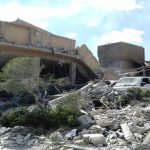At the end of the 80s the pharmaceutical industry in Syria was very poor, covering 6% of the national needs. In less than 20 years, with government support in terms of legal frame and strategic political engagement, the Syrian pharmaceutical industry finally covered almost 90% of the national needs, in terms of drugs, and exported drugs in around 52 Arabian countries.
Beyond covering the local market, the main added values of this huge development consisted in exporting drugs in the amount of 150 million dollars per year and providing jobs for 17,000 Syrian people, out of which around 85% are women.The quote is from the abstract for a paper, Pharmaceutical Industry in Syria, published in 2010 at the medical library site for the U.S. government National Institutes of Health. A Sputnik news report in October 2017, which links to the paper, adds that in 2010 (a year before the uprising in the country), there were 72 laboratories and pharmaceutical companies in Syria.
The Sputnik report was headlined Large Pharmaceutical Factory in Syria Rebuilt After Being Destroyed by Militants. As you can see if you read the report, Syria's pharmaceutical industry is finally getting back on its feet. The institute bombed by the U.S. on April 14 (Syria time) was a vital part of the recovery. From an April 15 SANA report:
The facility, called the Pharmaceutical and Chemical Industries Research Institute, works on preparing the chemical compositions for cancer drugs, and conducts chemical analyses of the materials entering Syria which are used in pharmaceutical and food industries.As you can see from photographs posted with the SANA report, the U.S. did a great job of wrecking the facility, which was obviously not a 'hard' target; here's one of the photos:
The wreckage is mute answer to claims that the U.S. provided Russia with a list of the sites they intended to bomb -- or if a list was provided, it didn't include the institute. Russia would never have agreed to the destruction of a facility that was a key element in restoring Syria's pharmaceutical industry, which of course needs imported chemicals to be tested for purity. The same for materials used in processed foods.
From this, I surmise that bombing the institute was intended to obstruct Syria's economic recovery -- and hang the health of all Syrians, who depend on the use of safe chemicals for medicines and processed foods.
********

No comments:
Post a Comment